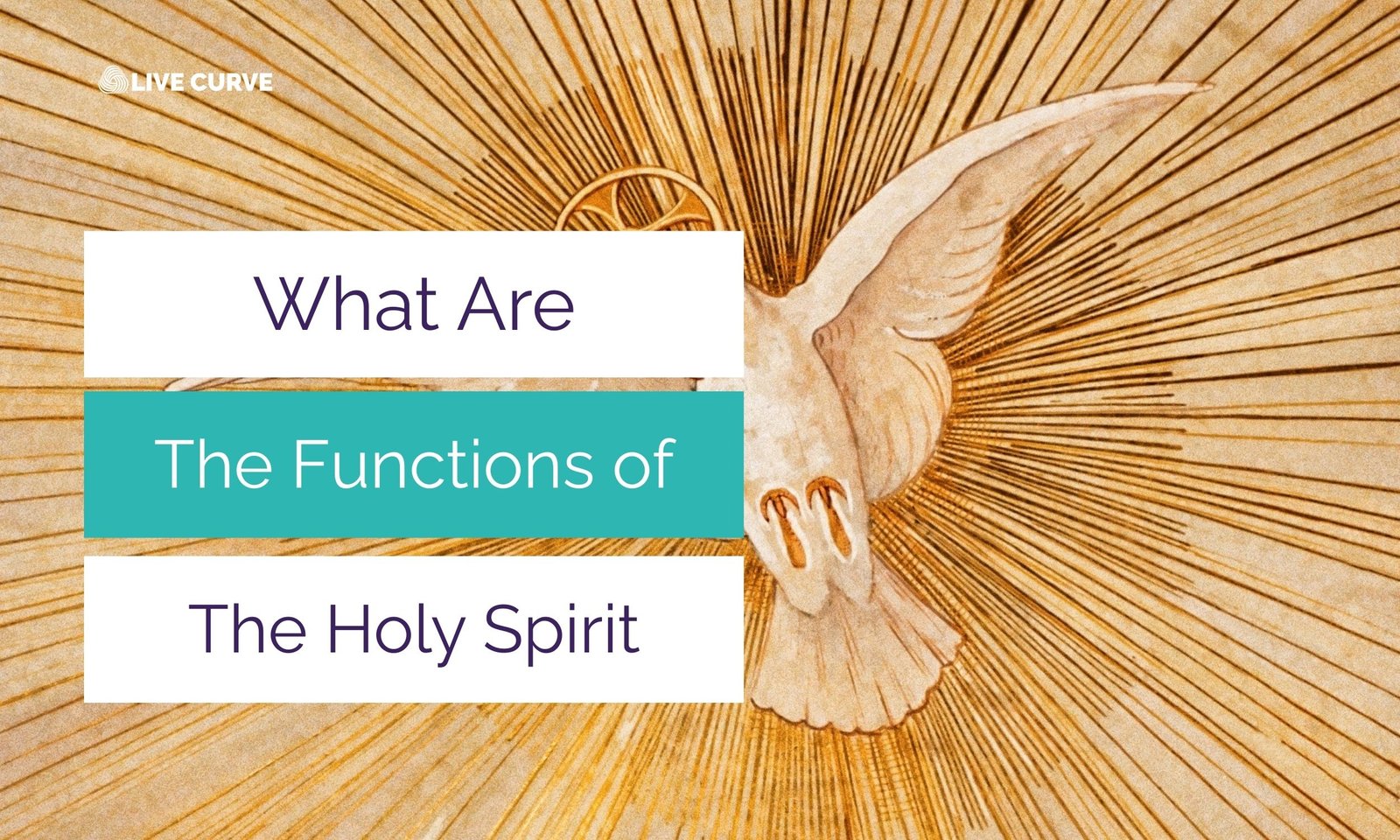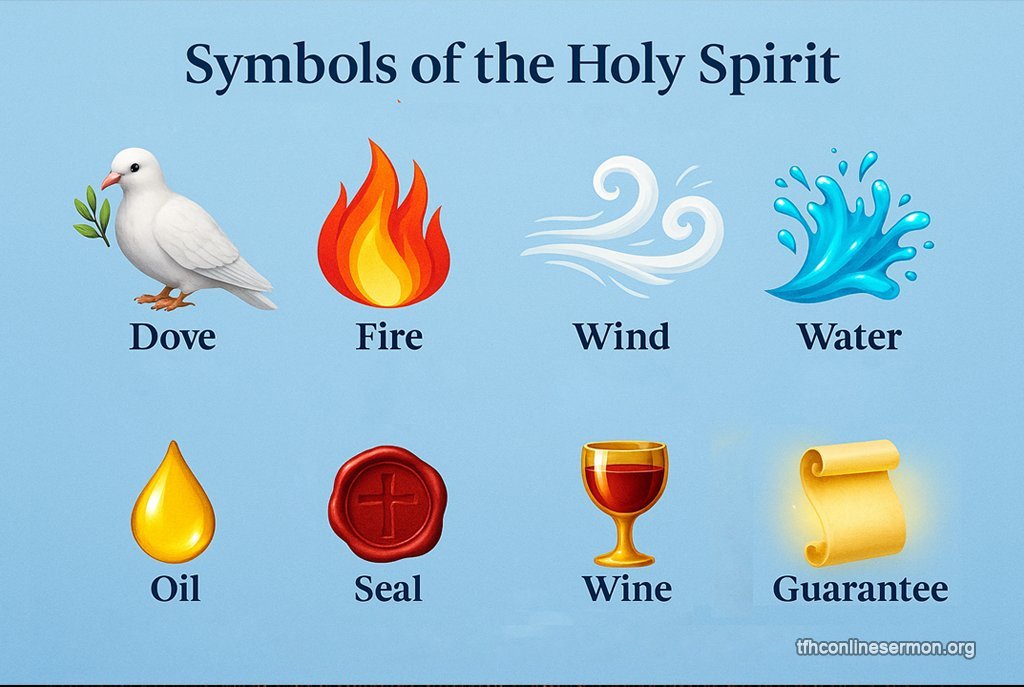When people ask, “Who is the Holy Spirit?”, they are asking one of the most important questions in Christian theology. The Holy Spirit is often mentioned in sermons, prayers, and scripture, yet many believers and seekers alike struggle to clearly define His identity and role of the Holy Spirit. As someone who has spent some time studying both theology and the intersection of faith with leadership, I have come to see that understanding the Holy Spirit is not just a matter of doctrine—it shapes how we live, lead, and grow.
From the very first pages of the Bible, the Spirit of God (Ruach Elohim) is present, hovering over creation (Genesis 1:2). In the New Testament, the Holy Spirit (Pneuma Hagion) is revealed as Comforter, Advocate, and Teacher—what the Greek language calls the Paraclete (John 14:26). This is not an abstract force or mystical energy, but the Third Person of the Trinity, fully divine and co-equal with the Father and the Son.
I find it significant that even today, the question of Who Is the Holy Spirit? continues to be asked, not only in churches but also among leaders, entrepreneurs, and influencers who want to understand spirituality at a deeper level. This is because the Holy Spirit is more than a theological idea; He is the One who empowers people with wisdom, conviction, guidance, and resilience.
In this publication, I will explore His identity, His biblical foundations, His divine nature, His roles, His symbols, and His ongoing relevance. By the time we reach the end, I trust you will have a much clearer understanding of who the Holy Spirit is and why this knowledge matters not only for your faith but also for the way you live and lead in today’s world.
The Identity of the Holy Spirit
When I reflect on the question, Who is the Holy Spirit?, I begin with the truth that the Holy Spirit is not an optional element of faith but a central figure in Christian belief. The identity of the Holy Spirit is grounded in Scripture and affirmed by centuries of theological reflection. He is recognized as the Third Person of the Trinity, fully God, eternally present, and distinct from both the Father and the Son.
Some people mistakenly think of the Holy Spirit as an impersonal power or a mysterious energy. Yet, if I am to speak with authority, I must emphasize that the Holy Spirit is a person. The Bible consistently describes Him with personal attributes: He speaks (Acts 13:2), He can be grieved (Ephesians 4:30), and He teaches and guides (John 14:26). An impersonal force cannot intercede or comfort. But the Holy Spirit, whom Jesus called the Paraclete or “Comforter,” does exactly that.
The Holy Spirit is also known by many titles in both the Old and New Testaments. In Hebrew, He is called Ruach Hakodesh, meaning “the Holy Breath” or “Spirit of Holiness.” This highlights His divine essence as life-giving and sanctifying. In Greek, the word Pneuma is used, which means “spirit” or “breath.” Jesus referred to Him as the Spirit of Truth (John 16:13), showing that His role includes leading people into understanding and preserving the truth revealed by God.
In older English translations such as the King James Version, the term Holy Ghost was used. Though today we commonly say “Holy Spirit,” both refer to the same divine person. I often remind readers that language evolves, but the essence of who He is does not change. Whether one calls Him the Holy Spirit or the Holy Ghost, His identity remains that of the divine Spirit who has existed eternally with God.
It is also worth noting that the Holy Spirit is fully divine. He is not lesser than the Father or the Son. When Peter confronted Ananias for lying, he declared that to lie to the Holy Spirit was to lie to God Himself (Acts 5:3–4). This shows the clear recognition of His deity within the early church. The Nicene Creed (AD 381), one of the foundational statements of Christian faith, affirms that the Holy Spirit is to be “worshipped and glorified together with the Father and the Son.”
So, when I answer the question Who Is the Holy Spirit?, I stress that He is God Himself—eternal, all-knowing, ever-present—who actively works in the world and in the lives of believers. His identity is relational, divine, and deeply personal.
Understanding the identity of the Holy Spirit is not just an academic exercise. It lays the foundation for everything else we will study in this article—His works, His symbols, His presence in the life of the church, and His relevance today. Once we see that He is fully God and fully personal, we begin to realize why our relationship with Him matters so much. To ignore the Holy Spirit is to miss out on the richness of Christian faith and the fullness of God’s presence in our daily lives.
Biblical Foundations & Terminology
To answer the question Who is the Holy Spirit?, we must go back to Scripture itself, because the Bible provides the clearest and most authoritative foundation for understanding His identity. The language used in both the Old and New Testaments reveals the richness of who He is and how He works.
In the Old Testament, the Hebrew word most often used for Spirit is Ruach. It carries the sense of “breath,” “wind,” or “spirit.” When the Bible says in Genesis 1:2 that the Spirit of God (Ruach Elohim) was hovering over the waters at creation, it highlights the Spirit’s life-giving and creative power. Later in Isaiah 63:10–11, He is referred to as the Holy Spirit (Ruach Hakodesh), underscoring His role in guiding and sustaining God’s people. To me, this shows that the Holy Spirit was not a late addition to Christian theology but present and active from the very beginning of God’s story with humanity.
The New Testament provides even more clarity. The Greek term Pneuma is used, which, like the Hebrew Ruach, means breath or spirit. But the New Testament writers, especially John and Paul, give the Holy Spirit additional titles that deepen our understanding of His role. Jesus calls Him the Paraclete—translated as Comforter, Helper, Advocate, or Counselor—in passages such as John 14:16 and John 14:26. This term highlights His personal and relational role in coming alongside believers to guide, teach, and strengthen them.
Another important designation is the Spirit of Truth (John 16:13). I find this phrase crucial because it emphasizes that the Holy Spirit not only comforts but also leads into truth, guarding against error and deception. Similarly, Paul calls Him the Spirit of Christ (Romans 8:9), showing the unity of purpose within the Trinity. The Holy Spirit continues the work of Christ by applying redemption to the lives of believers.
One of the theological disciplines that studies these biblical descriptions is called Pneumatology. This field of theology specifically examines the person and work of the Holy Spirit. As I have studied this area, I’ve realized how vital it is not only to understand titles but also to grasp the functions tied to those titles. For example, when the Bible calls Him the “Spirit of Adoption” (Romans 8:15), it is teaching us that He makes us children of God, giving us a new identity in Christ.
Even the variety of metaphors in Scripture—breath, fire, wind, water—speaks to the depth of who the Holy Spirit is. Each one communicates something different: breath gives life, fire purifies, wind moves with power, and water refreshes and sustains. Together, these descriptions help answer the question Who is the Holy Spirit? by pointing to His dynamic and transformative presence throughout salvation history.
For those who still wonder about His role, I often point them to the day of Pentecost in Acts 2. Here, the Holy Spirit comes in wind and fire, filling the disciples and empowering them to speak in different tongues. This moment was not just symbolic—it was the tangible expression of the Spirit’s arrival to dwell permanently with believers. It confirmed that the promise Jesus made about sending the Helper was now fulfilled.
Furthermore, the biblical terminology—Ruach Hakodesh, Pneuma, Paraclete, Spirit of Truth, Spirit of Christ—provides us with a rich vocabulary for understanding the Holy Spirit. These names are not random; they reveal His nature, His roles, and His intimate relationship with God’s people. Without them, our understanding of who He is would be incomplete.
Recommended Books About The Holy Spirit
- Good Morning Holy Spirit – Pastor Benny Hinn
- Forgotten God by Francis Chan
- The God I Never Knew: How Real Friendship with the Holy Spirit Can Change Your Life by Robert Morris
- The Mystery of the Holy Spirit by R.C. Sproul
Divine Nature & Person of The Holy Spirit
When people ask Who Is the Holy Spirit?, one of the most important truths to emphasize is that the Holy Spirit is not an abstract idea or an impersonal energy. He possesses full divine nature and genuine personhood. This means He is God Himself and at the same time a personal being who relates to us. Understanding this is crucial, because many misconceptions about the Spirit come from reducing Him to a mere influence or force.
The Bible consistently attributes personal qualities to the Holy Spirit. He speaks (Acts 13:2), teaches (John 14:26), intercedes (Romans 8:26), and can be grieved (Ephesians 4:30). These are not the actions of an impersonal power; they are the actions of a person who has a mind, will, and emotions. Whenever I read these passages, I am reminded that my relationship with the Spirit is not mechanical but deeply personal. He is someone who communicates, guides, and even feels when He is resisted.
At the same time, Scripture makes it clear that the Holy Spirit is fully divine. In Acts 5:3–4, Peter equates lying to the Holy Spirit with lying to God, leaving no doubt about His deity. Paul describes Him as the “Lord” in 2 Corinthians 3:17, affirming His co-equality with the Father and the Son. The Nicene Creed calls Him “the Lord, the Giver of Life,” a title that reflects His role in both creation and redemption. Only God can give life, and the Spirit does so continually, both in physical creation and in spiritual renewal.
His divine attributes confirm this reality. The Spirit is omnipresent, as David recognized in Psalm 139:7—“Where shall I go from your Spirit? Or where shall I flee from your presence?” He is omniscient, searching and knowing the deep things of God (1 Corinthians 2:10–11). He is eternal, described in Hebrews 9:14 as the “eternal Spirit.” These qualities are not shared by angels or forces; they belong only to God.
Recognizing the personhood and divinity of the Holy Spirit changes how we relate to Him. If He were just a force, we might try to “use” Him for our purposes. But because He is God and a personal being, we must instead submit to Him, listen to Him, and walk with Him. He is not manipulated; He leads. He is not a tool; He is the living presence of God with us.
Therefore, when I answer Who Is the Holy Spirit?, I affirm without hesitation that He is the divine Person of the Trinity—fully God, fully personal, and fully present. He is the Spirit who gives life, teaches truth, and draws us into fellowship with the Father and the Son. To know Him rightly is to know God more deeply, and to ignore Him is to miss out on the fullness of the Christian faith.
5 Roles & Functions in Scripture

One of the clearest ways to answer the question Who is the Holy Spirit? is by examining what He does. His identity is inseparable from His works, and the Bible consistently describes the role of the Holy Spirit as dynamic, purposeful, and essential to God’s relationship with humanity. From the opening chapter of Genesis to the closing chapter of Revelation, the Spirit is active, shaping creation, guiding God’s people, and empowering them for mission.
In the Old Testament
The Holy Spirit is seen at work long before the New Testament era. In Genesis 1:2, He is present at creation, hovering over the waters as the divine breath that brings life into existence. He empowers individuals such as Joseph (Genesis 41:38), Bezalel the craftsman (Exodus 31:3), and the prophets (Ezekiel 2:2). The Spirit’s role here is selective and temporary, equipping leaders, kings, and prophets for specific tasks. To me, this shows that the Spirit has always been involved in preparing people for God’s purposes, even before the fullness of His work was revealed.
In the Life and Ministry of Jesus
The New Testament presents the Spirit’s role even more vividly. Jesus was conceived by the Spirit (Luke 1:35), baptized in the Spirit (Luke 3:22), led by the Spirit (Luke 4:1), and empowered by the Spirit for His ministry (Luke 4:14–18). When Jesus promised His disciples the Paraclete, the Comforter, He was preparing them for a new reality: that the Holy Spirit would dwell permanently within believers. This underscores that Who Is the Holy Spirit? cannot be separated from the story of Christ. The Spirit is the divine presence who carried out God’s redemptive plan through the Son and now applies that redemption to us.
At Pentecost and in the Early Church
The day of Pentecost in Acts 2 marks a turning point in the role of the Holy Spirit. The Spirit descends with wind and fire, filling the disciples and empowering them to proclaim the gospel in multiple languages. This was not merely a spectacular event; it was the official birth of the church. From that day on, the Spirit indwelled every believer, not just a chosen few. Acts continues to show how the Spirit guided decisions (Acts 13:2), performed miracles through the apostles, and expanded the mission of the church. For me, Pentecost demonstrates that the Spirit’s work is universal, accessible to all who believe, and essential to the global spread of Christianity.
In the Life of the Believer
Perhaps the most personal answer to Who Is the Holy Spirit? lies in His ongoing role in individual believers. The Bible describes several key functions:
- Regeneration: The Spirit gives new life, making us born again (John 3:5–6).
- Indwelling: He takes residence within believers, making us temples of God (1 Corinthians 6:19).
- Sanctification: The Spirit transforms us, shaping us into Christ’s likeness (2 Thessalonians 2:13).
- Conviction of Sin: He reveals our need for repentance and righteousness (John 16:8).
- Guidance and Teaching: He leads us into truth and reminds us of Christ’s words (John 14:26; 16:13).
- Intercession: He prays for us when we do not know what to pray (Romans 8:26–27).
Beyond these inward roles, the Spirit equips believers with spiritual gifts (1 Corinthians 12:4–11) and cultivates the fruit of the Spirit—love, joy, peace, patience, kindness, goodness, faithfulness, gentleness, and self-control (Galatians 5:22–23). These are not optional extras but the visible evidence of His work in us.
For the Church and the World
The Spirit also unites believers into one body (1 Corinthians 12:13), empowers them for witness (Acts 1:8), and sustains the church through times of persecution and trial. Without the Spirit, the church would not survive, let alone thrive. This truth convinces me that any attempt to understand the identity of the Holy Spirit must acknowledge His vital role in shaping both individuals and communities of faith.
So then, Who Is the Holy Spirit? He is the one who gives life, convicts of sin, regenerates hearts, empowers service, and sustains the mission of God’s people. His roles are not confined to history but remain active today. To reduce Him to an abstract power is to ignore the richness of His ongoing work. To embrace Him as the divine person who equips and transforms is to experience the fullness of God’s presence in everyday life.
Theological Insights & Controversies
When people ask Who is the Holy Spirit?, I often explain that the answer depends not only on Scripture but also on how the church has interpreted His identity across history. For two thousand years, theologians have studied the Spirit’s nature and role, leading to deep insights but also some controversies that continue to shape Christian thought today.
The Procession of the Holy Spirit
One of the most debated questions in theology is: “From whom does the Holy Spirit proceed?” In John 15:26, Jesus says, “the Spirit of truth, who proceeds from the Father, will testify about me.” The early church agreed that the Spirit comes from the Father, but later Western theologians added the phrase “and the Son” (Filioque) to the Nicene Creed. This Filioque controversy created division between Eastern Orthodoxy and Western Christianity.
The Eastern Orthodox Church insists that the Spirit proceeds from the Father alone, preserving the Father as the sole source within the Trinity. The Roman Catholic Church, however, along with most Protestants, holds that the Spirit proceeds from both the Father and the Son, reflecting the unity between Christ and the Spirit in salvation. To this day, the Filioque remains one of the biggest differences in how Christians describe the identity of the Holy Spirit.
Perichoresis and Trinitarian Unity
Another theological concept that helps us understand Who Is the Holy Spirit is perichoresis. This Greek term describes the mutual indwelling of the Father, Son, and Spirit. Each person of the Trinity fully participates in the life of the others without losing distinct identity. I find this idea profoundly helpful because it emphasizes that the Spirit is not isolated but fully engaged in the loving fellowship of the Godhead. His work in believers always flows in harmony with the Father and the Son.
Denominational Views and Divergences
Different denominations also highlight unique aspects of the Spirit’s work. Catholics emphasize the sacraments and the Spirit’s role in preserving church tradition. Protestants often focus on the Spirit’s work in personal faith, the authority of Scripture, and spiritual renewal. Pentecostal and charismatic traditions place strong emphasis on the baptism of the Holy Spirit, speaking in tongues, healing, and spiritual gifts.
Non-Trinitarian groups such as Jehovah’s Witnesses and Unitarians take a radically different view. They describe the Holy Spirit not as a divine person but as a force or power. The Latter-day Saints (Mormons) distinguish between the Holy Spirit and the Holy Ghost, understanding Him as a spirit personage. While these views diverge from historic Trinitarian Christianity, they illustrate how central the Spirit is to Christian identity—because every group feels compelled to explain Him.
Why These Debates Matter
It may be tempting to dismiss these theological discussions as abstract, but I believe they are essential. How we define Who Is the Holy Spirit shapes how we worship, pray, and live. If He is merely a force, our relationship becomes mechanical. But if He is fully God and personal, then He is worthy of our worship, obedience, and love.
In the end, theology teaches us that the Holy Spirit is the divine presence who unites us with the Father and the Son. Disagreements over the Filioque or denominational emphases may continue, but the heart of the matter remains unchanged: the Spirit is God, He is personal, and He is active in the life of the church.
5 Symbols & Representations of The Holy Spirit

Sometimes the best way to understand Who Is the Holy Spirit? is by looking at the symbols Scripture uses to describe Him. Because the Spirit is invisible, the Bible frequently uses vivid imagery to make His presence and work more tangible. These symbols are not mere poetic flourishes; they are carefully chosen pictures that communicate deep truths about His nature.
The Dove
One of the most recognizable symbols of the Holy Spirit is the dove. At Jesus’ baptism, “the Holy Spirit descended on Him in bodily form like a dove” (Luke 3:22). The dove represents purity, peace, and divine approval. I often reflect on how this imagery shows the Spirit as gentle yet powerful, affirming Jesus’ mission and, by extension, affirming our identity as children of God.
Fire
Another common symbol is fire. At Pentecost, tongues of fire rested on the disciples (Acts 2:3–4), filling them with boldness and power. Fire signifies purification, transformation, and the Spirit’s ability to ignite passion for God. To me, this image emphasizes the Spirit’s role in refining our hearts and energizing our witness.
Wind
Wind also symbolizes the Spirit. In John 3:8, Jesus says, “The wind blows wherever it pleases… so it is with everyone born of the Spirit.” Wind is unseen yet powerful, moving freely and unpredictably. This symbol highlights the Spirit’s sovereignty and freedom to work beyond human control.
Water and Oil
Water is a symbol of refreshment and life. Jesus spoke of the Spirit as “rivers of living water” (John 7:38–39), reminding us of His role in renewal and sustenance. Oil, often used for anointing in the Old Testament, symbolizes consecration and empowerment. Kings and prophets were anointed with oil, foreshadowing the Spirit’s work of setting people apart for divine purposes.
Cloud and Light
The Spirit has also been associated with cloud and light, symbols of God’s presence in the Old Testament (Exodus 13:21–22). These images remind me that the Spirit both reveals and conceals—guiding us while reminding us of the mystery of God.
In sum, the symbols of the Holy Spirit—dove, fire, wind, water, oil, cloud, and light—help us see who He is and how He works. They point to His purity, power, freedom, renewal, empowerment, and guiding presence. When we ask Who is the Holy Spirit?, these images provide windows into His character and invite us to experience His work more personally.
Relevance of The Holy Spirit In Today’s Dispensation
Whenever I answer the question Who is the Holy Spirit?, I try not to leave it in the realm of abstract theology. The truth is that His presence and work are as relevant today as they were in biblical times. For modern leaders, entrepreneurs, and influencers, understanding the role of the Holy Spirit can transform not only personal faith but also professional practice and daily life.
The Spirit gives wisdom, and wisdom is indispensable for decision-making in any sphere. James 1:5 reminds us that God gives wisdom generously to those who ask. In my experience, the Holy Spirit provides clarity in moments of confusion, offering perspective that goes beyond human reasoning. This is as crucial in boardrooms and classrooms as it is in churches.
The Holy Spirit also equips people with discernment. In a world saturated with noise, misinformation, and competing agendas, the Spirit helps us separate truth from error. I believe this is vital for brand managers, executives, and influencers who must lead with integrity and authenticity. The Spirit of Truth still guides today, ensuring that leaders act not only strategically but also ethically.
Moreover, the Spirit empowers resilience. Entrepreneurs and small business owners often face setbacks, but the Spirit strengthens us with perseverance and inner peace. The fruit of the Spirit—love, joy, peace, patience, kindness, and self-control—are not just spiritual virtues; they are qualities that build trust, shape culture, and inspire confidence in any team or organization.
So, Who Is the Holy Spirit today? He is the divine presence who guides leaders, fuels creativity, anchors ethical decision-making, and sustains us with hope. His relevance extends beyond Sunday worship into the very heart of how we work, lead, and live in the twenty-first century.
Conclusion
As I draw this study to a close, the question Who Is the Holy Spirit? stands answered with both depth and clarity. The Holy Spirit is not a vague force or mystical presence but the Third Person of the Trinity—fully God, fully personal, and fully present in the world today. From creation to Pentecost, from the lives of prophets and apostles to our own experiences, His role has always been to give life, guide, convict, empower, and transform.
For me, the most powerful truth is that the Spirit is not distant. He is the Comforter who walks alongside us, the Spirit of Truth who keeps us grounded, and the Giver of Life who renews us daily. His presence is as relevant for a business owner making tough decisions as it is for a believer seeking spiritual growth.
So I encourage you: reflect on your own answer to the question Who Is the Holy Spirit?. Knowing Him more fully means experiencing God more intimately—and that is the most transformative relationship you can ever have.
Frequently Asked Questions About the Holy Spirit
Who Is the Holy Spirit in Christianity?
The Holy Spirit is the Third Person of the Trinity—fully God, co-equal with the Father and the Son. He is not an impersonal force or mystical energy but a divine person who speaks, guides, and relates to believers. From creation (Genesis 1:2) to the resurrection (Romans 8:11), the Spirit is actively involved in God’s work. When we ask Who Is the Holy Spirit?, we are speaking of the very presence of God with us.
What is the difference between the Holy Spirit and the Holy Ghost?
The terms Holy Spirit and Holy Ghost mean the same thing. The difference is mainly linguistic and historical. Older English translations such as the King James Bible used “Holy Ghost,” while most modern translations now prefer “Holy Spirit.” Both describe the same divine person. The shift in language helps avoid confusion, since the word “ghost” today often carries meanings unrelated to the biblical sense.
What is the role of the Holy Spirit in the life of a believer?
The role of the Holy Spirit is comprehensive. He convicts us of sin (John 16:8), regenerates our hearts (John 3:5–6), and indwells us as temples of God (1 Corinthians 6:19). He sanctifies us, shaping us to reflect Christ’s character (2 Thessalonians 2:13). He also gives spiritual gifts (1 Corinthians 12:4–11) and produces the fruit of the Spirit—love, joy, peace, patience, kindness, goodness, faithfulness, gentleness, and self-control (Galatians 5:22–23). In short, His role is to empower, guide, and transform us.
What are the main symbols of the Holy Spirit?
The symbols of the Holy Spirit include the dove (purity and peace), fire (purification and power), wind (sovereignty and movement), water (refreshment and renewal), and oil (anointing and consecration). These images are drawn from Scripture, and each one emphasizes a different dimension of His work. For example, the Spirit as fire at Pentecost (Acts 2:3–4) shows His power to energize the mission of the church.
Why is the Holy Spirit called the Comforter or Paraclete?
Jesus called the Spirit the Paraclete in John 14:26. The Greek word Paraklētos means “one who comes alongside to help.” This is why the Holy Spirit is also called the Comforter, Counselor, or Advocate. To me, this title beautifully captures His role in guiding, encouraging, and standing with believers in times of weakness or trial. He is not distant; He is present as our Helper.
How does the Holy Spirit guide believers today?
The Spirit guides through Scripture, prayer, conviction, and inner prompting. Jesus promised that the Spirit would “lead you into all truth” (John 16:13). For many leaders and professionals, this guidance often comes as clarity in decision-making or the conviction to pursue integrity when compromise is easier. When I have faced tough choices, I’ve found the Spirit’s guidance to be quiet yet unmistakable—steering my heart toward what honors God.
What is the role of the Holy Spirit in salvation?
Salvation is not possible without the Spirit. He opens our hearts to the gospel, convicts us of sin, regenerates us into new life, and assures us of our adoption as children of God (Romans 8:15–16). The Spirit also seals believers, guaranteeing our eternal inheritance (Ephesians 1:13–14). When people ask Who Is the Holy Spirit? in the context of salvation, the answer is clear: He is the divine agent who makes redemption personal and real.
How can someone experience the Holy Spirit more fully?
The Bible teaches that we experience the Spirit by faith, prayer, and obedience. Ephesians 5:18 urges believers to “be filled with the Spirit,” meaning we yield to His influence daily. This comes through meditating on God’s Word, cultivating prayer, and living in surrender to His leading. Experiencing the Spirit more fully is not about emotional highs but about consistent relationship and trust.
Prayer Points
1. Prayer for Awareness of His Personhood
Lord, open my eyes to truly know Who the Holy Spirit is—not as a distant force, but as the living Person of the Trinity. Help me walk daily with Him in love, reverence, and obedience (Acts 5:3–4; John 14:26).
2. Prayer for Fresh Encounter at Creation Level
Father, as Your Spirit hovered over the waters at creation, let the Holy Spirit breathe new life into my heart, my work, and my family. May He bring order where there is chaos and renewal where there is dryness (Genesis 1:2).
3. Prayer for Wisdom and Guidance
Spirit of Truth, guide me into all truth. Help me make wise decisions in my business, my leadership, and my personal life. Keep me from error and deception (John 16:13).
4. Prayer for Purification and Power
Holy Spirit, come like fire and burn away everything in me that does not please You. Purify my heart, and empower me with boldness to live out my calling (Acts 2:3–4).
5. Prayer for Spiritual Renewal
Lord, let the rivers of living water flow from within me through the indwelling of the Holy Spirit. Refresh me, renew me, and strengthen me for every season of life (John 7:38–39).
6. Prayer for Fruit of the Spirit
Holy Spirit, cultivate in me the fruit of the Spirit—love, joy, peace, patience, kindness, goodness, faithfulness, gentleness, and self-control. Let my character reflect Christ in everything I do (Galatians 5:22–23).
7. Prayer for Spiritual Gifts
Lord, I ask for the gifts of the Holy Spirit. Equip me to serve others with wisdom, discernment, faith, and power. Let my gifts build up the church and glorify Your name (1 Corinthians 12:4–11).
8. Prayer for Comfort and Strength
Comforter, come alongside me in my weakness. Strengthen me in trials, encourage me in discouragement, and remind me that I am never alone (John 14:16; Romans 8:26).
9. Prayer for Leadership and Influence
Holy Spirit, empower me to lead with integrity, humility, and discernment. Let my influence reflect Your wisdom and inspire transformation in those I serve (Acts 1:8).
10. Prayer of Surrender
Lord, fill me afresh with Your Spirit. I surrender my plans, my thoughts, and my ways to You. May the Holy Spirit lead me daily and use me for Your glory (Ephesians 5:18).














